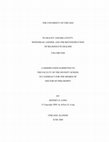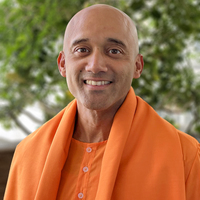Lexington Series by Jeffery Long

The region historically known as the Indian subcontinent (and more recently as South Asia) is ric... more The region historically known as the Indian subcontinent (and more recently as South Asia) is rich with ancient and sophisticated traditions of intellectual and contemplative investigation. This includes both indigenous traditions (Hindu, Buddhist, Jain, and Sikh) and traditions that have found a home in this region (Islamic, Christian, Jewish, and Zoroastrian). This series is devoted to studies rooted in critical and constructive methodologies (such as ethics, philosophy, and theology) that show how these traditions can illuminate universal human questions: questions about the meaning of life, the nature of knowledge, good and evil, and the broader metaphysical context of human existence. A particular focus of this series is the relevance of these traditions to urgent issues that face humanity today–such as the ecological crisis, gender relations, poverty and social inequality, and religiously motivated violence–on the assumption that these traditions, far from being of merely historical interest, have the potential to enrich contemporary conversations and advance human understanding.
Doctoral Dissertation by Jeffery Long

This dissertation attempts to construct a pluralistic approach to religion in the tradition of Ra... more This dissertation attempts to construct a pluralistic approach to religion in the tradition of Raimon Panikkar and John Hick, but with a significant difference. Unlike their theories, my approach is based on a synthesis of Whitehead’s process metaphysics and the Jain “philosophy of relativity.” I claim that a form of religious pluralism can be developed on the basis of this synthesis that expresses the understanding of the relativity of truth central to current versions of this position, without rejecting altogether the notion of an absolute truth as the logical foundation for the relativity of religious claims. The traditional Jain approach to religious and philosophical plurality is the model I use for developing a pluralistic system for the interpretation and evaluation of particular religious claims as relatively true, but I do so on the basis of Whitehead’s metaphysical theism. I claim that this approach improves upon previous theories while yet advancing the same basic position that many religions can be conceived as, in various senses, true.
Books (plus Reviews) by Jeffery Long

In the emerging field of world philosophy, Indian philosophy occupies a position of special impo... more In the emerging field of world philosophy, Indian philosophy occupies a position of special importance. Firstly, the Indian intellectual tradition has ongoing and direct relevance to the lives of over a billion human beings–constituting, as it does, the conceptual backgrounds of both the Hindu and Buddhist religions–religions that command the loyalty and shape the lives of persons across Asia and, increasingly, globally.
Indian philosophy also has both historical and philosophical significance for scholars of many cultural backgrounds. In terms of historical significance, understanding Indian philosophy is clearly central to an adequate understanding of the intellectual history of the Indian subcontinent. But Indian philosophy also has ancient ties to the European intellectual tradition from the inception of the latter, having close affinities to both pre-Socratic and Platonic thought, as well as being an important–albeit a little known and indirect–interlocutor with and influence upon early Christianity.
Substantively, Indian philosophies are relevant to a host of issues currently being explored by contemporary philosophers, particularly in relation to the nature of language, consciousness, and self. Distinctions made in Western philosophy among pre-modern, modern, and post-modern thought do not, in Indian philosophy, correspond to neatly separable historical periods–or rather, they do so even less in Indian philosophy than they do in the Western philosophical tradition. In other words, views that could be fairly described in substantive terms as “modern” and “post-modern” in a European or American intellectual context were present from a very early period in India. The modern and post-modern critiques of knowledge and power are anticipated and ways of approaching philosophical issues developed in classical Indian philosophy that continue to hold more than only historical interest for contemporary philosophers.
This volume will provide an historical overview of the Indian philosophical tradition from its pre-systematic foundations in ancient Indian reflection on the nature of the universe and humanity’s place within it, through the development of its subtle and highly sophisticated systematic forms in the classical period, to its modern continuation in the work of major figures who continue to refine and define this tradition in our world today. It will present these traditions in way that is sufficiently clear to be useful for beginning students of Indian philosophy, either in a university or college setting, or privately. It will also provide an extensive bibliography of sources that interested readers can use to continue their studies of particular traditions or issues in greater depth.
The book will begin with an introduction that will outline for the reader the broad contours of Indian philosophy–its distinctive concerns and assumptions (which will be preceded by a brief note to the reader regarding the correct pronunciation of Sanskrit terms). The first section, or set of chapters, of the book proper will be devoted to the ancient, pre-systematic phase of Indian philosophy as found in the literature of both Vedic and non-Vedic traditions of the first two millennia before the Common Era. The second section, which will constitute the majority of the text, will explore the classical systems of Indian philosophy in detail, with attention to issues and debates among the adherents of these systems. The third section will examine the modern period. The volume will conclude with a reflective chapter on the importance of studying the traditions covered in this book, a brief overview of relevant literature in this field, a chronology, glossary, bibliography, and index.

Incorporating a blend of historical and anthropological approaches, this book will trace the hist... more Incorporating a blend of historical and anthropological approaches, this book will trace the histories and the contemporary thought and practice of several distinct but inter-related (and sometimes overlapping) groups: immigrant or diasporic Hindu communities in North America; “converts,” or adherents of Hinduism from various ethnic backgrounds who were not born to Hindu families; and groups centered on the teaching of a particular guru or yoga tradition with clear Hindu provenance, not all of which self-identify as Hindu. It will also explore the influence and diffusion of Hindu concepts and practices such as karma and rebirth, meditation, and yoga in American consciousness, particularly through the medium of popular culture, and the emergence of an increasingly assertive socially and politically active American Hinduism. The research for this book will include both the already existing literature in this field and primary research by the author (including participant observation in Hindu American events, undertaken over the course of the last fifteen years, and interviews and interactions with a wide range of persons involved in the Hindu American community). The basic thesis of this book is that the phenomenon of Hinduism in America cannot be fully grasped unless one is attentive not only to diasporic Hindu communities, but also to converts and to the wider penumbra of guru traditions, the yoga movement, and larger cultural currents such as the emergence of the “spiritual but not religious” phenomenon.
Religions, MDPI, 2019
A volume of essays on the topic of rebirth, or reincarnation, which explore this topic from theol... more A volume of essays on the topic of rebirth, or reincarnation, which explore this topic from theological, philosophical, historical, and literary perspectives, with a primary focus on Hindu, Christian, and scientific claims about this topic.

This volume focuses on Buddhism and Jainism, two religions which, together with Hinduism, constit... more This volume focuses on Buddhism and Jainism, two religions which, together with Hinduism, constitute the three pillars of Indic religious tradition in its classical formulation. It explores their history and relates how the Vedic period in the history of Hinduism drew to a close around the sixth century BCE and how its gradual etiolation gave rise to a number of religious movements. While some of these remained within the fold of the Vedic traditions, others arose in a context of a more ambiguous relationship between the two. Two of these have survived to the present day as Buddhism and Jainism. The volume describes the major role Buddhism played in the history not only of India but of Asia, and now the world as well, and the more confined role of Jainism in India until relatively recent times. It examines the followers of these religions and their influence on the Indian religious landscape. In addition, it depicts the transformative effect on existing traditions of the encounter of Hinduism with these two religions, as well as the fertile interaction between the three. The book shows how Buddhism and Jainism share the basic concepts of karma, rebirth, and liberation with Hinduism while giving them their own hue, and how they differ from the Hindu tradition in their understanding of the role of the Vedas, the “caste system,” and ritualism in religious life. The volume contributes to the debate on whether the proper way of describing the relationship between the three major components of the classical Indic tradition is to treat them as siblings (sometimes as even exhibiting sibling rivalry), or as friends (sometimes even exhibiting schadenfreude), or as radical alternatives to one another, or all of these at different points in time.
See attached link to Google Books for most of the text of this book.
See attached link to Google Books for most of the text of this book.
Review by Ellen Gough of my book, Jainism: An Introduction (London: I.B. Taurus, 2009)

Two radically different ideologies are currently competing for the loyalties of the Hindu communi... more Two radically different ideologies are currently competing for the loyalties of the Hindu community. One of these ideologies, Hindu nationalism, conceives of Hinduness as co-extensive with Indianness. The other ideology, which has been articulated by such figures as Sri Ramakrishna and Mahatma Gandhi, repesents Hinduism as the 'eternal' or 'universal' religion. This is an idea of Hinduism that is pluralistic and all-inclusive. Arguing that Hindu nationalism is not only destructive of communal relations, but that it also prevents Hinduism from emerging as a world religion in the true sense of the term, the author here explores a reconfigured version of the second of these two ideologies. He presents a vision of Hinduism as a tradition capable of pointing the way towards a future in which all the world's religions manifest complementary visions of a larger reality - and in which they all, in various ways, participate. This radical religious agenda puts a new and ex...
See attached link to Google Books for most of the text of this book.
Review by Jean MacPhail of A Vision for Hinduism (American Vedantist, Summer 2007).
Review by M. Sivaramakrishna of A Vision for Hinduism, Prabuddha Bharata, January, 2010
This volume of primary readings (mostly English translations from Sanskrit) is designed as a com... more This volume of primary readings (mostly English translations from Sanskrit) is designed as a companion volume to the author’s Indian Philosophy: An Introduction, also to be published by I.B. Tauris. Each chapter of this volume will correspond to a chapter of Indian Philosophy: An Introduction. The intention is that the two can be read in tandem, either in the context of an advanced undergraduate or beginning graduate course in Indian philosophy, or as part of private study of this subject.
An in-depth exploration of the teachings of Swami Vivekananda and their relevance to such pressin... more An in-depth exploration of the teachings of Swami Vivekananda and their relevance to such pressing contemporary issues as inter-religious relations, religious fundamentalism, religion and violence, the challenge of the "new atheism," and the "spiritual but not religious" movement.
Papers by Jeffery Long

Religions, 2024
The well-known modern Hindu reformer and pioneer of Vedānta in the West, Swami Vivekananda (1863–... more The well-known modern Hindu reformer and pioneer of Vedānta in the West, Swami Vivekananda (1863–1902), based his ethical vision on mysticism: specifically, on the direct experience of non-duality and the ultimate unity and organic interconnectedness of all beings. This paper will explore the implications of this experientially based ethos for caste prejudice. Caste remains a hot-button issue in India to the present day and was no less so in the time of Swami Vivekananda. This system of social organization is rightly criticized by social justice advocates for the inequities it enshrines and enforces in Indian society. Because it has historically been justified by reference to Hindu textual sources—specifically such Dharma Śāstras as the Manusmṛti—prejudice based on caste, or casteism, has frequently been depicted, especially by critics of Hinduism, as essential or inherent to Hindu traditions. The implication of this identification of caste with Hinduism, and caste with social injustice, is that Hinduism is an intrinsically wicked and unjust religion. Such simplistic equations fail to consider the extent to which caste prejudice has been condemned by authoritative Hindu teachers, not least, by Swami Vivekananda himself. It is thus important to rearticulate Swami Vivekananda’s rejection of caste prejudice—and indeed, of all prejudice—based on Advaita Vedānta both to make the case against such prejudice in today’s world and to address criticisms of Hinduism as inherently or essentially casteist. Finally, it will be noted that Vivekananda’s criticisms of caste anticipate those of a contemporary anti-casteist voice from the Advaita tradition: that of Hindu theologian Anantanand Rambachan, who has also argued against prejudices of various kinds, including caste prejudice, based on Advaita Vedānta.

Religions, 2023
Saradamani Mukhopadhyay (1853–1920), more widely known as Sarada Devi and, to her devotees, the H... more Saradamani Mukhopadhyay (1853–1920), more widely known as Sarada Devi and, to her devotees, the Holy Mother, presents an illuminating case study of the various means by which, in many respects, a highly traditional and typical rural Hindu woman of her time, operating from within the categories of Bengali Hindu society, was able to navigate these categories in ways that did not undermine, but rather enhanced, her agency, enabling her to shape her social reality in creative and transformative ways. Inhabiting the traditional role of mother and nurturer while carrying it out in a highly non-traditional manner, Sarada Devi played a central, often behind-the-scenes, role as a major influencer of an important modern Hindu spiritual movement—indeed, the first such movement to be able to boast an international following. Having no biological children of her own, Sarada Devi became the mother to this movement and to the monastic order dedicated to carrying forward the vision of her husband, Sri Ramakrishna Paramahamsa (1836–1886), as interpreted both by herself and his disciples, the most prominent of whom was Swami Vivekananda (1863–1902), who is well known for having brought Ramakrishna’s teachings to the Western world through his lectures in America, including at the World Parliament of Religions held in Chicago in 1893 and his founding of the first Vedanta Societies, starting in New York in 1894.
Journal of Dharma Studies, 2022
While it is sometimes characterized as a "world-denying" philosophy, Advaita, or non-dual Vedānta... more While it is sometimes characterized as a "world-denying" philosophy, Advaita, or non-dual Vedānta, with its vision of the ultimate oneness of all existence, bears within itself the capacity to form the conceptual basis not only for liberation as it traditionally understood in Hindu traditions-as mokṣa, or freedom from the cycle of rebirth-but also for a project of human emancipation in a more conventional, socio-political sense-as freedom from oppression and injustice. This paper will examine Advaita Vedānta, particularly as presented by Swami Vivekananda (1863-1902), in terms of its implications for deep ecology.









Uploads
Lexington Series by Jeffery Long
Doctoral Dissertation by Jeffery Long
Books (plus Reviews) by Jeffery Long
Indian philosophy also has both historical and philosophical significance for scholars of many cultural backgrounds. In terms of historical significance, understanding Indian philosophy is clearly central to an adequate understanding of the intellectual history of the Indian subcontinent. But Indian philosophy also has ancient ties to the European intellectual tradition from the inception of the latter, having close affinities to both pre-Socratic and Platonic thought, as well as being an important–albeit a little known and indirect–interlocutor with and influence upon early Christianity.
Substantively, Indian philosophies are relevant to a host of issues currently being explored by contemporary philosophers, particularly in relation to the nature of language, consciousness, and self. Distinctions made in Western philosophy among pre-modern, modern, and post-modern thought do not, in Indian philosophy, correspond to neatly separable historical periods–or rather, they do so even less in Indian philosophy than they do in the Western philosophical tradition. In other words, views that could be fairly described in substantive terms as “modern” and “post-modern” in a European or American intellectual context were present from a very early period in India. The modern and post-modern critiques of knowledge and power are anticipated and ways of approaching philosophical issues developed in classical Indian philosophy that continue to hold more than only historical interest for contemporary philosophers.
This volume will provide an historical overview of the Indian philosophical tradition from its pre-systematic foundations in ancient Indian reflection on the nature of the universe and humanity’s place within it, through the development of its subtle and highly sophisticated systematic forms in the classical period, to its modern continuation in the work of major figures who continue to refine and define this tradition in our world today. It will present these traditions in way that is sufficiently clear to be useful for beginning students of Indian philosophy, either in a university or college setting, or privately. It will also provide an extensive bibliography of sources that interested readers can use to continue their studies of particular traditions or issues in greater depth.
The book will begin with an introduction that will outline for the reader the broad contours of Indian philosophy–its distinctive concerns and assumptions (which will be preceded by a brief note to the reader regarding the correct pronunciation of Sanskrit terms). The first section, or set of chapters, of the book proper will be devoted to the ancient, pre-systematic phase of Indian philosophy as found in the literature of both Vedic and non-Vedic traditions of the first two millennia before the Common Era. The second section, which will constitute the majority of the text, will explore the classical systems of Indian philosophy in detail, with attention to issues and debates among the adherents of these systems. The third section will examine the modern period. The volume will conclude with a reflective chapter on the importance of studying the traditions covered in this book, a brief overview of relevant literature in this field, a chronology, glossary, bibliography, and index.
Papers by Jeffery Long
Indian philosophy also has both historical and philosophical significance for scholars of many cultural backgrounds. In terms of historical significance, understanding Indian philosophy is clearly central to an adequate understanding of the intellectual history of the Indian subcontinent. But Indian philosophy also has ancient ties to the European intellectual tradition from the inception of the latter, having close affinities to both pre-Socratic and Platonic thought, as well as being an important–albeit a little known and indirect–interlocutor with and influence upon early Christianity.
Substantively, Indian philosophies are relevant to a host of issues currently being explored by contemporary philosophers, particularly in relation to the nature of language, consciousness, and self. Distinctions made in Western philosophy among pre-modern, modern, and post-modern thought do not, in Indian philosophy, correspond to neatly separable historical periods–or rather, they do so even less in Indian philosophy than they do in the Western philosophical tradition. In other words, views that could be fairly described in substantive terms as “modern” and “post-modern” in a European or American intellectual context were present from a very early period in India. The modern and post-modern critiques of knowledge and power are anticipated and ways of approaching philosophical issues developed in classical Indian philosophy that continue to hold more than only historical interest for contemporary philosophers.
This volume will provide an historical overview of the Indian philosophical tradition from its pre-systematic foundations in ancient Indian reflection on the nature of the universe and humanity’s place within it, through the development of its subtle and highly sophisticated systematic forms in the classical period, to its modern continuation in the work of major figures who continue to refine and define this tradition in our world today. It will present these traditions in way that is sufficiently clear to be useful for beginning students of Indian philosophy, either in a university or college setting, or privately. It will also provide an extensive bibliography of sources that interested readers can use to continue their studies of particular traditions or issues in greater depth.
The book will begin with an introduction that will outline for the reader the broad contours of Indian philosophy–its distinctive concerns and assumptions (which will be preceded by a brief note to the reader regarding the correct pronunciation of Sanskrit terms). The first section, or set of chapters, of the book proper will be devoted to the ancient, pre-systematic phase of Indian philosophy as found in the literature of both Vedic and non-Vedic traditions of the first two millennia before the Common Era. The second section, which will constitute the majority of the text, will explore the classical systems of Indian philosophy in detail, with attention to issues and debates among the adherents of these systems. The third section will examine the modern period. The volume will conclude with a reflective chapter on the importance of studying the traditions covered in this book, a brief overview of relevant literature in this field, a chronology, glossary, bibliography, and index.
With this audacious and articulate book, journalist Hindol Sengupta presents an impassioned and most welcome case for Hinduism as an ancient and sophisticated tradition with great relevance for the contemporary world. Noting quite rightly that Hindu traditions are poorly understood not only in the West but often even within India itself, Sengupta first traces his own journey as a Bengali Hindu growing up in Calcutta (today Kolkata), attending a Christian missionary school while also being introduced, through his family, to the Vedanta tradition as taught by Swami Vivekananda. The book is not so much a scholarly presentation of Hinduism, as one might find in an introductory textbook, as it is an invitation to the reader to join the author in his discovery of the tradition of his upbringing.
American Journal of Indic Studies
ISSN 2573-2145 (Print) ISSN 2573-1939 (Online)
Submissions open for the Inaugural Issue Volume 1 No 1
American Journal of Indic Studies (AJIS) is a peer-reviewed journal published by the American Academy of Indic Studies (AAIS).
AJIS invites academic papers on all aspects of Indic studies broadly defined (please check https://aaindicstudies.org/publication/) and their academic study and analysis in the world, for publication in Volume 1 Number 1, and its subsequent issues.
AJIS publishes papers that call attention to the meanings and applications of Indic categories, which have typically been under-represented in the academic study of Indic civilization, to analyze specific theoretical and methodological issues within Indic studies across academic disciplines. AJIS also welcomes papers that place Indic categories and explanatory models in conversation with western theoretical and methodological models in order to deepen and expand scholarly knowledge of Indic civilization. Interactions and relationship of western and non-western studies on Indic history, culture, and traditions are also considered for publication in this issue of the journal.
Papers on all aspects of Indic Studies, and their interdisciplinary studies in any of the following disciplines of Anthropology, Archaeology, Diaspora Indic Studies, Ethical Thought, Ecological & Environmental Studies, History & Culture, Human Geography, India-America relations, Indic Elements & Hindu-Buddhist relations in Asia, Language & Linguistics, Media Studies, Philosophy, Politics & Public Administration, Religious Studies, Social Work, Sociology, and Gender Studies will be considered for publication.
American Journal of Indic Studies publishes original papers, reflection papers, theoretical & conceptual frameworks, analytical & empirical research, applied research & field notes, and book & film reviews.
Date of Publishing: AJIS is inviting papers for Vol. 1 No. 1 scheduled to be published in Winter 2017.
Submission deadline: August 28, 2017.
Contributions for subsequent volumes will be accepted on a rolling basis and considered on a first-come-first-serve basis for the next available upcoming volume. Please include brief bio and a short CV with your submission.
Send your manuscript and questions to the editor Dr. Lavanya Vemsani at: editor@AAIndicStudies.org
Dr. Lavanya Vemsani
Editor-in-Chief, American Journal of Indic Studies https://aaindicstudies.org/publication/
Professor, Department of Social Sciences, Shawnee State University
No recent publications, however, have dealt extensively with this issue in an interdisciplinary fashion that draws upon the multiple perspectives from which it can be approached. The purpose of this special issue is to fill this gap, bringing together perspectives from religious studies, philosophy, theology, and the sciences (specifically, psychology and physics) to address the question: Is there such a phenomenon as rebirth? Why or why not? How might one go about knowing whether such a phenomenon is a reality? What historical perspectives, specifically from Hindu and Christian traditions, can be brought to bear upon this question? And what, if anything, can science potentially contribute to what has traditionally been a religious and philosophical question? The aim here is to advance mutual understanding among those who hold differing views on this topic, as well as, potentially, advancing understanding of the topic itself.
Dr. Jeffery D. Long
Guest Editor
Submission
Manuscripts should be submitted online at www.mdpi.com by registering and logging in to this website. Once you are registered, click here to go to the submission form. Manuscripts can be submitted until the deadline. Papers will be published continuously (as soon as accepted) and will be listed together on the special issue website. Research articles, review articles as well as communications are invited. For planned papers, a title and short abstract (about 100 words) can be sent to the Editorial Office for announcement on this website.
Submitted manuscripts should not have been published previously, nor be under consideration for publication elsewhere (except conference proceedings papers). All manuscripts are refereed through a peer-review process. A guide for authors and other relevant information for submission of manuscripts is available on the Instructions for Authors page. Religions is an international peer-reviewed Open Access monthly journal published by MDPI.
Please visit the Instructions for Authors page before submitting a manuscript. There will be no processing charge for submissions to this special issue. Please disregard all references to a fee in the MDPI website.
Keywords
reincarnation
rebirth
Hindu-Christian dialogue
Hinduism
Christianity
parapsychology
science and religion